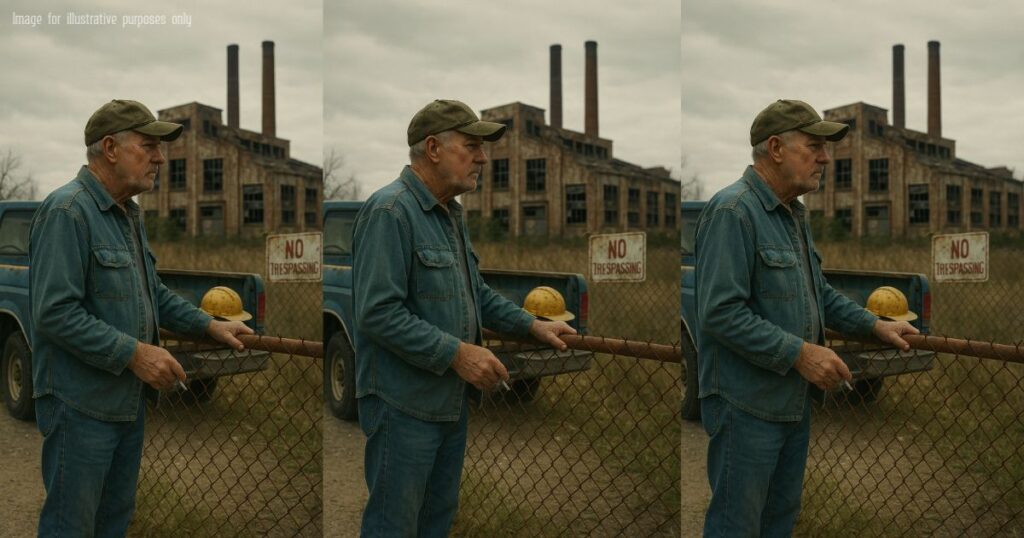By a man who still smells like pulp and pine
I spent 42 years turning trees into paper, and I wasn’t allowed to write a single damn word of truth.
That thought came to me as I stood outside the crumbling gates of Mill 42, the rusted chain-link fence sagging like an old man’s shoulders.
The “No Trespassing” sign was bent and sun-faded. Like everything else here, it had been forgotten.
I leaned against the tailgate of my ‘89 Ford, engine ticking from the ride up Highway 7, and watched the smokestacks that hadn’t puffed in six years.
Grass grew through the gravel where union picket signs once stood. I swear, I could still hear the hum of machines and men—hundreds of boots marching toward whistles, lunchboxes in hand, and dignity in their stride.
I lit a cigarette. Doctor says I shouldn’t, but what’s he gonna do, revoke my pension?
That building raised me. Not in the way a mother does, with lullabies and birthday cakes. But in the way a place can—through pain, sweat, and the steady rhythm of showing up when you’d rather quit.
My old man worked here before me. Lost two fingers in the chipper. Said it made it easier to flick his Marlboro. We weren’t a sentimental bunch.
But standing there now, boots planted in gravel and lungs pulling in the sour ghost of lignin, I felt something swell behind my ribs. Not just sorrow. Not just pride. Something else. Like all those years had built something inside me I never named.
It was the final week before the mill closed. November 1998. I remember because my youngest, Trevor, had just turned twelve, and he kept asking if I’d still be “a man” if I didn’t wear steel-toes anymore.
There was a mandatory meeting. Management sat us in the old breakroom. Used to smell like burnt coffee and Copenhagen, now it reeked of fake sympathy.
The new VP from corporate—some slick-haired kid from Chicago who wore loafers to a pulp mill—stood in front of a room full of men who’d sweated through the Carter years, Reaganomics, and the ’82 recession. He cleared his throat like we were freshmen in a seminar.
“I just want to thank you all for your years of service. Unfortunately, globalization has made operations like Mill 42 financially unsustainable…”
I looked around. Some guys nodded. Some stared blankly at their hands. No one said a word. We were trained that way—don’t rock the boat, don’t talk back, don’t think you’re smarter than the foreman.
But something inside me snapped. Maybe it was the way he said “operations” like we weren’t flesh and blood.
Maybe it was because I’d skipped Trevor’s school play the week before for an emergency double shift, and now none of it mattered.
I stood up.
“You ever touch a wood press in your life?” I asked.
The room went still. Like a wrench clanking to the floor.
The VP blinked. “I’m sorry?”
“You ever spend a night inhaling dust while your back burns from lifting green rolls? You ever fix a jammed chipper in the snow at 2 a.m. so some kid in Boston can draw cartoons on paper?”
He opened his mouth, but nothing came out.
I kept going. I didn’t even know where the words were coming from.
“You call it unsustainable. We called it life. We fed our kids with this place. Buried our brothers from this place. We made your profits possible. And now you want a handshake and a cake?”
A few men nodded. One clapped. Then another.
I didn’t get fired. What were they gonna do—shut us down twice?
But something shifted in me. I’d spent 42 years repeating what foremen wanted to hear. “Yes, sir.” “No problem.” “I’ll stay late.” And in my final days, I finally said what I meant.
Six years later, the mill sits hollow. They turned the office wing into a vape distribution center. The rest was left to rot.
I came back because Trevor said I should let it go. “It’s just a job, Dad,” he said. “People move on.”
But it wasn’t just a job. It was where I learned that real men carry each other when the line goes down.
Where you don’t quit because your back hurts or your boss is an ass. Where nobody cares what college you went to, only whether you’ll show up in a snowstorm.
It was where I learned silence could be a prison. And where, in the end, I learned how to speak.
I dropped my cigarette and crushed it beneath my boot.
Then I walked to the gate, pried it open just enough to slip through, and stood in the shadow of what we built.
No plaque. No tribute. Just dust, rust, and echoes.
But I raised my voice anyway, not for anyone else, just for me:
“We were here. We mattered. Even if no one wrote it down.”
And for the first time in years, I felt free.
There was a man inside the mill.
I saw him just past the boiler house—silhouette against a broken window, coat flapping like a flag in the windless air. For a second, I thought I was seeing things. Maybe it was the light. Or the memories. Or maybe it was the ghost of my old crew, still punching in long after the world forgot we existed.
But no. He moved.
I ducked behind a stack of old pallets, heart thumping louder than it should’ve. I’m seventy-two. The most action I’ve had lately was chasing squirrels off the bird feeder. I told myself I’d come here for closure, not trouble. Still, my boots moved on their own, crunching slow across the gravel, toward the machine floor where we once ran shifts like clockwork.


